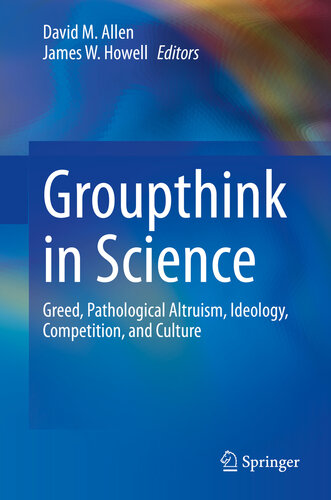Groupthink in Science: Greed, Pathological Altruism, Ideology, Competition, and Culture 2020
دانلود کتاب پزشکی گروهاندیشی در علم: حرص، نوعدوستی آسیبشناسانه، ایدئولوژی، رقابت و فرهنگ
ناشر:
Springer Nature
| نویسنده |
David M. Allen, James W. Howell |
|---|
| تعداد صفحهها |
278 |
|---|---|
| نوع فایل |
epub |
| حجم |
2 Mb |
| سال انتشار |
2020 |
89,000 تومان
دانلود ۳۰.۰۰۰ کتاب پزشکی فقط با قیمت یک کتاب و ۹۹ هزار تومان !
توضیحات
این کتاب یکی از داغ ترین موضوعات علم امروز را مورد بحث قرار می دهد، نگرانی برای برخی از شیوه های مشکل ساز در نهاد علمی. پرسشهایی را مطرح میکند و مهمتر از آن، شروع به ارائه پاسخهایی درباره پدیدهای فراگیر میکند که گاهی مانع پیشرفت علمی میشود: فرآیندهای گروهی. این کتاب بسیاری از جنبههای مشکلساز «همراهی با جمعیت» را بررسی میکند که به قیمت حقیقت پذیرفته شدهاند. مفهوم نوع دوستی بیمارگونه یا سوگیری نوع دوستی بسیار مرتبط است – تمایل دانشمندان به جانبداری در تحقیقات خود به منظور پیشبرد منافع ایدئولوژیکی یا مالی “در گروه” به بهای منافع گروه های دیگر و همچنین واقعیت. . این کتاب این تصور رایج را که علم همیشه یک فرآیند خیرخواهانه است به چالش می کشد. این نهاد علمی را در عمل بر خلاف نظریه، به عنوان یک سیستم فرهنگی که برای تولید دانش واقعی طراحی شده است، تعریف می کند. در واقع، این کتاب دیدگاهی گسترده و منحصر به فرد از یک موضوع مهم و ناتمام ارائه می دهد: تحقیق و گفتمان دانشگاهی که عینیت علمی، شاید حتی استانداردهای اخلاقی یک دانشمند را قربانی می کند تا اهداف گروه خاصی از محققان را پیش ببرد یا آنها را پیش ببرد. سیستم اعتقادی مشترک یا منافع خودشان، خواه اقتصادی باشد، ایدئولوژی یا بوروکراسی.
توضیحات(انگلیسی)
This book discusses one of the hottest topics in science today, i.e., the concern over certain problematic practices within the scientific enterprise. It raises questions and, more importantly, begins to supply answers about one particularly widespread phenomenon that sometimes impedes scientific progress: group processes. The book looks at many problematic manifestations of “going along with the crowd” that are adopted at the expense of truth. Closely related is the concept of pathological altruism or altruism bias—the tendency of scientists to bias their research in order to further the ideological or financial interests of an “in-group” at the expense of both the interest of other groups as well as the truth. The book challenges the widespread notion that science is invariably a benevolent, benign process. It defines the scientific enterprise, in practice as opposed to in theory, as a cultural system designed to produce factual knowledge. In effect, the book offers a broad and unique take on an important and incompletely explored subject: research and academic discourse that sacrifices scientific objectivity, and perhaps even the scientist’s own ethical standards, in order to further the goals of a particular group of researchers or reinforce their shared belief system or their own interests, whether economic, ideological, or bureaucratic.



